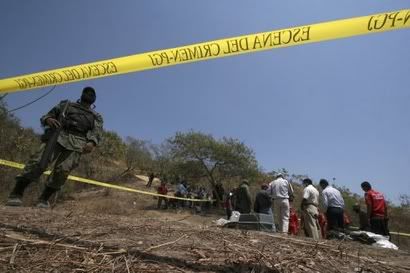To: All
6 more bodies in Mexican border pits; total at 183 Excerpt

A Mexican soldier guards the site of a mass grave where the bodies of nine people were found buried.
Security forces have unearthed six more bodies in a northeastern Mexican border state where a drug gang is believed to be kidnapping passengers from buses and hiding their victims in secret graves, authorities said Tuesday. A total of 183 bodies have been discovered in a month in 40 graves.
The horrific discoveries have intensified criticism that lawlessness reigns in Tamaulipas state, where the Zetas drug gang has terrorized migrants trying to make their way north to the United States. It is the same region where authorities say the Zetas killed 72 Central American migrants in August.
Meanwhile, a different search over the last month in the capital of northwestern Durango state has yielded 96 bodies in two mass graves as of Tuesday, said Gerardo Ortiz, spokesman for the state attorney general's office.
State investigators led by federal agents have exhumed 79 bodies in a car repair shop of a working-class neighborhood of Durango city, Ortiz said. Seventeen other decomposed bodies were found in mid-April next to a well-known hacienda in the city, less than a mile away from the car shop.
snip
Security forces began exhuming the corpses on April 1 after they were led to the site by suspects who confessed to kidnapping and killing bus passengers traveling through the area.
The motive for the bus abductions remains unclear, though prosecutors have suggested the gang may be forcefully recruiting people to work for it. Morales said the Zetas have also been extorting migrants for up to $2,000. Those whose families pay are led across the border to the U.S. by the Zetas themselves, she said.
992 posted on
04/27/2011 5:42:51 AM PDT by
MestaMachine
(If you want to pillage,plunder,destroy, blaspheme,or defile, become a muslim, or name yourself obama)
Iran's Ahmadinejad in growing rift with top cleric

Excerpt:
Iran's president on Wednesday shunned a Cabinet meeting for the second consecutive time this week, apparently showing his discontent over a recent government appointment by the country's supreme leader.
There is a growing rift between Mahmoud Ahmadinejad and Ayatollah Ali Khamenei, who has final say in all Iranian state matters.
The confrontation stems from Ahmadinejad's recent dismissal of the intelligence minister, Heidar Moslehi, who was ordered by the president to resign last week. The minister was then promptly reinstated by Khamenei in a public slap to the president.
On Saturday, Khamenei warned in a speech broadcast on state TV that he will intervene in the government's affairs whenever necessary — a rebuke to Ahmadinejad for challenging his all-encompassing authority.
Although Khamenei ordered Moslehi to remain in the Cabinet, the president reportedly didn't give in to the order and failed to officially invite Moslehi to Sunday's session. Surprisingly, Moslehi showed up and Ahmadinejad abstained.
Iranian media reported that Moslehi attended the Cabinet session Wednesday but Ahmadinejad again abstained.
The Ahmadinejad-Khamenei discord could destabilize Iran from within. The country is at odds with the West and under U.N. sanctions over its controversial nuclear program.
It could also cast a shadow on the remaining two years of Ahmadinejad's presidency.
Ahmadinejad's gamble appears to be aimed at setting up a confidant to become the next president, analysts say. He needs to control the Intelligence Ministry in order to influence the next parliament as well as who becomes the next president, they say.
Khamenei is believed to be intent on helping shape a new political team, absent of Ahmadinejad loyalists, to lead the next government.
993 posted on
04/27/2011 6:42:45 AM PDT by
MestaMachine
(If you want to pillage,plunder,destroy, blaspheme,or defile, become a muslim, or name yourself obama)
FreeRepublic.com is powered by software copyright 2000-2008 John Robinson

